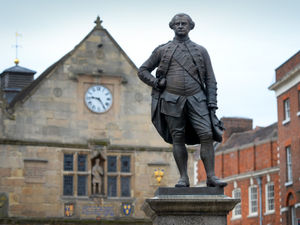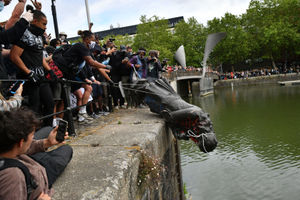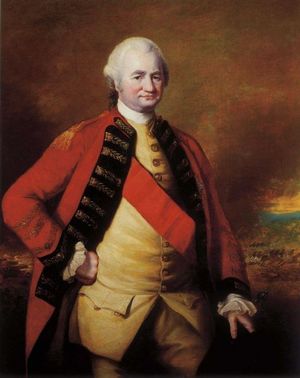5,000 sign petitions to remove Clive of India statue from Shrewsbury Square
More than 5,000 have added their support to calls for the removal of Shrewsbury’s Clive of India statue.

Inspired by the Black Lives Matter protests which saw a statue of slave trader Edward Colston torn town from its plinth in Bristol on Sunday, two online petitions have been launched for the figure of Robert Clive to be taken down from the Square, where it has stood since 1860.
Both petitions were created on Sunday and had been signed by more than 5,000 people by Tuesday morning.
Critics say the town’s former MP and mayor should not be celebrated in such a way due to his part in establishing British colonial control of India and large parts of south east Asia through his role in the East India Company.
Described by historian and India expert William Dalrymple as an “unstable sociopath,” Clive’s rule as the first British Governor of Bengal saw widespread looting of the region’s wealth and treasures.

Changes the company made to taxes and agricultural policies are said to have led to the Bengal Famine of 1770, which saw around a third of the region’s population starve to death.
'How can we be comfortable with this?'
One of the petitions, started by David Parton, says: “While this statue is not anti-black racism, it goes some way to illustrate how embedded racism is in the UK.
“This statue commemorates Clive, and by so doing embodies the racist and inhumane nature of his actions.
“If we are not comfortable with a statue of Joseph Stalin or Genghis Khan, how can we be comfortable with a statue of Clive?”
Mr Parton said the figure should be replaced by that of another local notable figure such as war poet Wilfred Owen, who lived in Monkmoor and was born in Oswestry, or poet and novelist Mary Webb.
“If the events of the last few days mean anything at all, they require white people to confront the racism we perpetuate every day – including on our doorstep,” Mr Parton said.
“I started this petition to begin the conversation about everyday racism in the UK and my hometown of Shrewsbury.
“Clive stands on a plinth in the centre of The Square, but was central to 200 years of theft, mis-rule that led to thousands of deaths, and eye-watering brutality in large swathes of the Indian subcontinent.
“It illustrates how embedded racism and white supremacy is in the UK. That’s why #CliveMustFall.”

Shrewsbury MP Daniel Kawczynski called for peaceful discussion on the future of the statue and said he would not be commenting on Robert Clive's life until he had finished a research paper examining his life "blow by blow".
A second petition, started by Jake Thompson, says the statue should be replaced with a figure of “someone more worthy of celebration”.
It adds: “Just because a figure is historical, that doesn’t make him good. He is nothing more than an figure of oppression and white supremacy that has, whether consciously or not, been celebrated and commemorated in Shrewsbury Town centre for hundreds of years.
“I urge people to look past any sentimental notions they may have attached to the statue or of the pleasing aesthetic that it may imbue onto the town square and realise the more important issue of celebrating a tyrant.”
In brief: Who was Robert Clive?
Clive was born on the Styche Hall estate, near Market Drayton, in 1725 and went to school in London before travelling to India with the East India Company in 1743.
After two years in Britain, in 1755 Clive returned to India and two years later retook Calcutta (now Kolkata) for the company at the Battle of Plassey, a key moment on Britain's path to controlling Bengal and then India for almost two centuries.
Corruption and looting saw Clive amass a huge amount of wealth and he returned to Britain in 1760, aged 34.
He was made Baron Clive of Passey, knighted and became Shrewsbury's MP, a position he held until his death.
He went back to India in 1765 for two years before returning to Britain where the activities of Clive and the East India Company in India came under sustained attack.
The famine of Bengal that lasted between 1769 and 1773 and killed around a third of the region's population was said to have largely been caused by the company's policies.
Clive defended himself in Parliament, saying "I stand astonished at my own moderation," and in 1773 Parliament declared that he did “render great and meritorious services to his country.”
He died at home in London aged 49 and is believed to have killed himself.
Both petitions can be found by searching ‘Clive of India’ on change.org.




